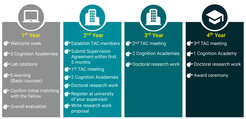Max Planck School of Cognition
In Germany, the best researchers in a specific field are often working at different universities and non-university research organizations spread throughout the country. The Max Planck Schools serve as hubs gathering this distributed knowledge. Here, the brightest minds in their respective fields come together from within the scientific community to interconnect in faculties.
The MPI for Human Development is participating in one of the three existing Max Planck Schools, namely the Max Planck School of Cognition (MPSCog). The school is coordinated by the Max Planck Institute for Human Cognitive and Brain Sciences in Leipzig, and has its Berlin hub at the MPI for Human Development’s Max Planck Dahlem Campus of Cognition. Ralph Hertwig, Ulman Lindenberger, and Iyad Rahwan are faculty members of the school. It offers an international 4-year doctoral program starting each September, with a 1-year orientation phase followed by 3 years of research for the doctorate. Students can enter the program with a bachelor’s (fast-track) or a master’s degree.

Year 1
Figure 1 shows the general schedule of the 4 years of MPSCog doctoral training. During the 1st year (the orientation phase), emphasis is put on teaching and prolonged laboratory rotations, usually in three different labs of MPSCog faculty members. An important goal of the orientation period is that doctoral candidates acquire interdisciplinary or multidisciplinary perspectives on a selected common research theme (e.g., by combining artificial intelligence and cognitive neuroscience or psychology and basic anatomy). Lab rotations allow 1st-year doctoral candidates to explore several different research groups associated with the MPSCog’s program. Students further define their individual research interests and eventually choose a laboratory where they will conduct their doctoral research work in the following 3 years. At the MPI for Human Development, we regularly have students doing their lab rotations with the participating Centers or research groups (see Table 1).
| Name | Cohort | Laboratory Visited |
|---|---|---|
| Tamer Ajaj | 2020 | Iyad Rahwan |
| Maria Badanova | 2020 | Ulman Lindenberger, Douglas Garrett |
| Clara Bersch | 2020 | Ralph Hertwig |
| Surabhi S. Nath | 2020 | Ralph Hertwig |
| Rena Bayramova | 2021 | Nicolas Schuck |
| Max A. B. Hinrichs | 2021 | Nicolas Schuck |
| Thomas Graham | 2022 | Ralph Hertwig, Bernhard Spitzer |
| Tiantian Li | 2022 | Ulman Lindenberger, Martin Dahl |
Doctoral candidates are expected to attend basic scientific units presented in two categories: e-learning courses that cover the essentials in a specific area, and cognition academies (classroom weeks) in which doctoral candidates meet in person. The first cognition academy, to introduce the MPISCog’s program, takes place as a welcome week at the beginning of the 1st academic year. It is followed by three academies each year.
Although the academic program is conducted in English, being able to learn the German language benefits all doctoral candidates. Thus the MPSCog offers a German course to all its international candidates to reduce language barriers and improve their daily life.
The 1st year is completed with an evaluation of the performance of each doctoral candidate before they advance to the doctoral research phase (years 2–4). Only after successful evaluation can doctoral students select a faculty member for their supervisory team. Table 2 shows the students carrying out their doctoral research at the MPI for Human Development.
| Name | Advisor(s) | Cohort | Dissertation Title |
|---|---|---|---|
| Pietro Nickl | Ralph Hertwig, Iyad Rahwan | 2019 | The social dynamics of cultural evolution online |
| Caedyn Stinson | Ralph Hertwig | 2019 | Cognitive mechanisms of social sampling from memory |
| Clara Bersch | Iyad Rahwan | 2020 | The psychological and societal impacts of AI advisory systems and their implications for AI design |
| Fabian Renz | Nicolas Schuck | 2020 | Replay induced representation changes |
| Fabian Kamp | Ulman Lindenberger, Douglas Garrett | 2021 | Neural dynamics of adaptive cognition |
| Konstantin Offer | Ralph Hertwig | 2021 | Deliberate ignorance as a strategic device in social interactions |
Years 2 and 3
At the beginning of the 2nd year, doctoral candidates work together with their selected supervisor to develop a feasible and relevant project proposal, which is then presented to a thesis advisory committee (TAC). After approval of the research plan, doctoral candidates start their individual project. Furthermore, doctoral candidates attend two academies per year, each of which lasts 2 weeks. Each academy involves 1 week of courses on advanced topics and 1 week of presentations on select research topics by doctoral candidates, faculty, and guest speakers.
Year 4
Students are expected to finalize their dissertation by the end of the 4th year. In addition, they attend one cognition academy involving presentations on respective research topics by faculty, students, and guest speakers. At the end of the 4th year, the doctoral degrees will be awarded by the university to which the supervisor of the respective candidate is affiliated.
